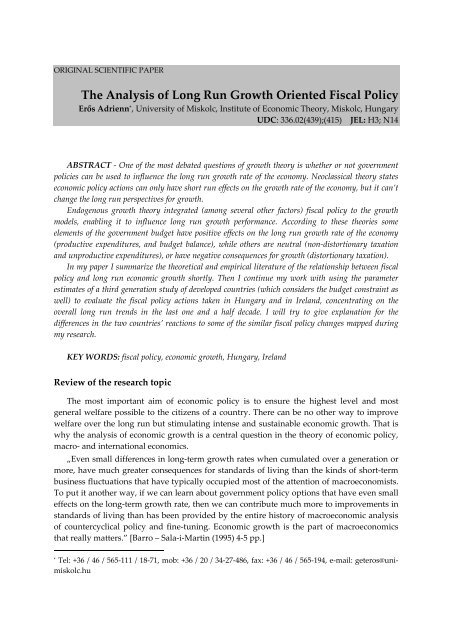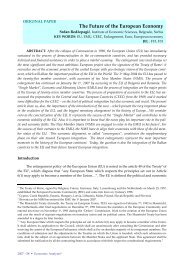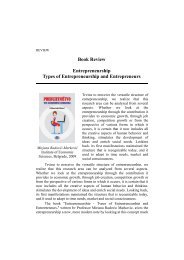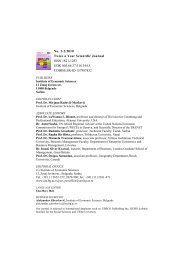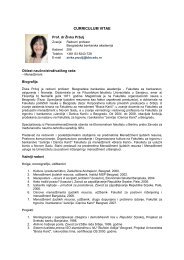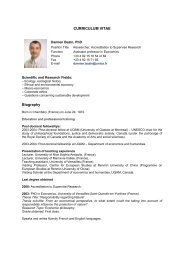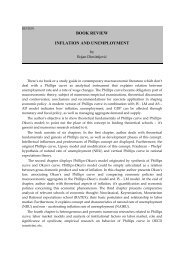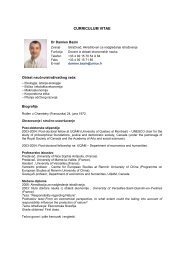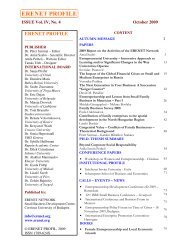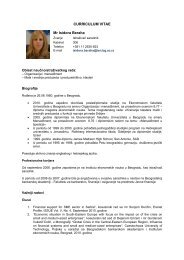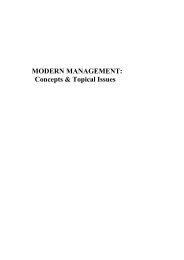Twice a Year Scientific Journal
Twice a Year Scientific Journal
Twice a Year Scientific Journal
Create successful ePaper yourself
Turn your PDF publications into a flip-book with our unique Google optimized e-Paper software.
ORIGINAL SCIENTIFIC PAPER<br />
The Analysis of Long Run Growth Oriented Fiscal Policy<br />
Erős Adrienn * , University of Miskolc, Institute of Economic Theory, Miskolc, Hungary<br />
UDC: 336.02(439);(415) JEL: H3; N14<br />
ABSTRACT - One of the most debated questions of growth theory is whether or not government<br />
policies can be used to influence the long run growth rate of the economy. Neoclassical theory states<br />
economic policy actions can only have short run effects on the growth rate of the economy, but it can’t<br />
change the long run perspectives for growth.<br />
Endogenous growth theory integrated (among several other factors) fiscal policy to the growth<br />
models, enabling it to influence long run growth performance. According to these theories some<br />
elements of the government budget have positive effects on the long run growth rate of the economy<br />
(productive expenditures, and budget balance), while others are neutral (non-distortionary taxation<br />
and unproductive expenditures), or have negative consequences for growth (distortionary taxation).<br />
In my paper I summarize the theoretical and empirical literature of the relationship between fiscal<br />
policy and long run economic growth shortly. Then I continue my work with using the parameter<br />
estimates of a third generation study of developed countries (which considers the budget constraint as<br />
well) to evaluate the fiscal policy actions taken in Hungary and in Ireland, concentrating on the<br />
overall long run trends in the last one and a half decade. I will try to give explanation for the<br />
differences in the two countries’ reactions to some of the similar fiscal policy changes mapped during<br />
my research.<br />
KEY WORDS: fiscal policy, economic growth, Hungary, Ireland<br />
Review of the research topic<br />
The most important aim of economic policy is to ensure the highest level and most<br />
general welfare possible to the citizens of a country. There can be no other way to improve<br />
welfare over the long run but stimulating intense and sustainable economic growth. That is<br />
why the analysis of economic growth is a central question in the theory of economic policy,<br />
macro- and international economics.<br />
„Even small differences in long-term growth rates when cumulated over a generation or<br />
more, have much greater consequences for standards of living than the kinds of short-term<br />
business fluctuations that have typically occupied most of the attention of macroeconomists.<br />
To put it another way, if we can learn about government policy options that have even small<br />
effects on the long-term growth rate, then we can contribute much more to improvements in<br />
standards of living than has been provided by the entire history of macroeconomic analysis<br />
of countercyclical policy and fine-tuning. Economic growth is the part of macroeconomics<br />
that really matters.” [Barro – Sala-i-Martin (1995) 4-5 pp.]<br />
*<br />
Tel: +36 / 46 / 565-111 / 18-71, mob: +36 / 20 / 34-27-486, fax: +36 / 46 / 565-194, e-mail: geteros@unimiskolc.hu


